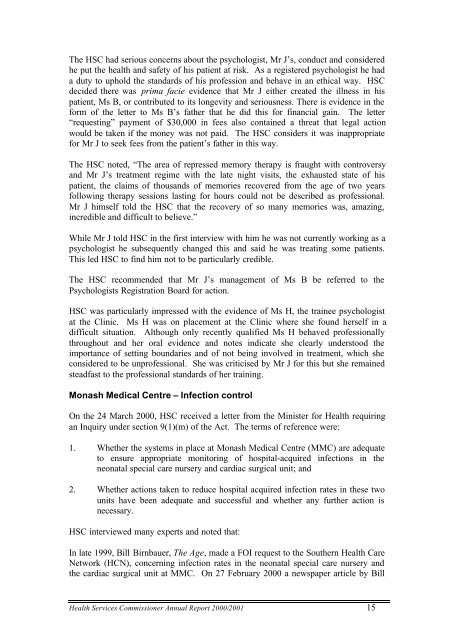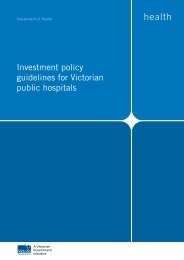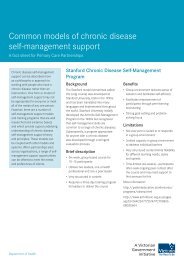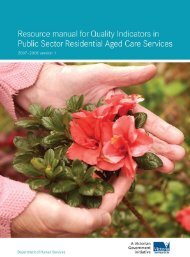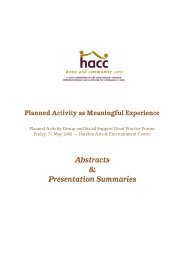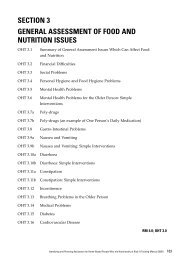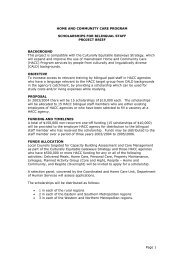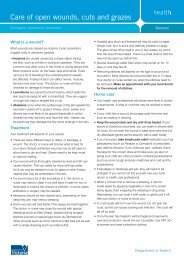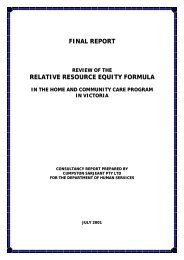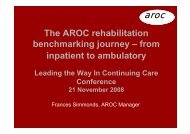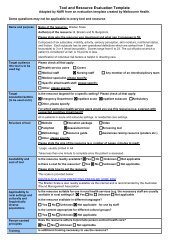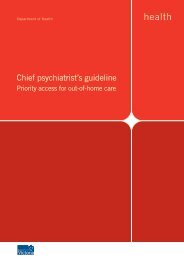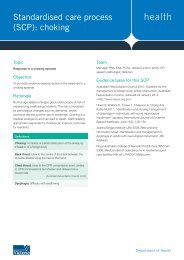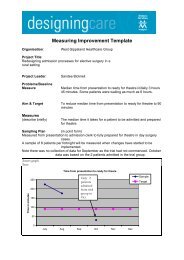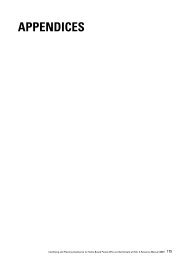Health Services Commissioner Annual Report 2000/2001
Health Services Commissioner Annual Report 2000/2001
Health Services Commissioner Annual Report 2000/2001
Create successful ePaper yourself
Turn your PDF publications into a flip-book with our unique Google optimized e-Paper software.
The HSC had serious concerns about the psychologist, Mr J’s, conduct and considered<br />
he put the health and safety of his patient at risk. As a registered psychologist he had<br />
a duty to uphold the standards of his profession and behave in an ethical way. HSC<br />
decided there was prima facie evidence that Mr J either created the illness in his<br />
patient, Ms B, or contributed to its longevity and seriousness. There is evidence in the<br />
form of the letter to Ms B’s father that he did this for financial gain. The letter<br />
“requesting” payment of $30,000 in fees also contained a threat that legal action<br />
would be taken if the money was not paid. The HSC considers it was inappropriate<br />
for Mr J to seek fees from the patient’s father in this way.<br />
The HSC noted, “The area of repressed memory therapy is fraught with controversy<br />
and Mr J’s treatment regime with the late night visits, the exhausted state of his<br />
patient, the claims of thousands of memories recovered from the age of two years<br />
following therapy sessions lasting for hours could not be described as professional.<br />
Mr J himself told the HSC that the recovery of so many memories was, amazing,<br />
incredible and difficult to believe.”<br />
While Mr J told HSC in the first interview with him he was not currently working as a<br />
psychologist he subsequently changed this and said he was treating some patients.<br />
This led HSC to find him not to be particularly credible.<br />
The HSC recommended that Mr J’s management of Ms B be referred to the<br />
Psychologists Registration Board for action.<br />
HSC was particularly impressed with the evidence of Ms H, the trainee psychologist<br />
at the Clinic. Ms H was on placement at the Clinic where she found herself in a<br />
difficult situation. Although only recently qualified Ms H behaved professionally<br />
throughout and her oral evidence and notes indicate she clearly understood the<br />
importance of setting boundaries and of not being involved in treatment, which she<br />
considered to be unprofessional. She was criticised by Mr J for this but she remained<br />
steadfast to the professional standards of her training.<br />
Monash Medical Centre – Infection control<br />
On the 24 March <strong>2000</strong>, HSC received a letter from the Minister for <strong>Health</strong> requiring<br />
an Inquiry under section 9(1)(m) of the Act. The terms of reference were:<br />
1. Whether the systems in place at Monash Medical Centre (MMC) are adequate<br />
to ensure appropriate monitoring of hospital-acquired infections in the<br />
neonatal special care nursery and cardiac surgical unit; and<br />
2. Whether actions taken to reduce hospital acquired infection rates in these two<br />
units have been adequate and successful and whether any further action is<br />
necessary.<br />
HSC interviewed many experts and noted that:<br />
In late 1999, Bill Birnbauer, The Age, made a FOI request to the Southern <strong>Health</strong> Care<br />
Network (HCN), concerning infection rates in the neonatal special care nursery and<br />
the cardiac surgical unit at MMC. On 27 February <strong>2000</strong> a newspaper article by Bill<br />
<strong>Health</strong> <strong>Services</strong> <strong>Commissioner</strong> <strong>Annual</strong> <strong>Report</strong> <strong>2000</strong>/<strong>2001</strong> 15


